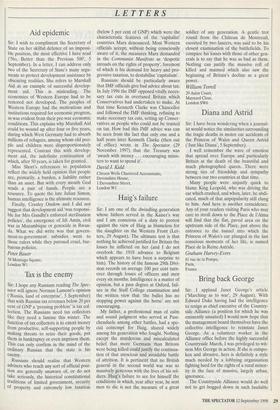Tax is the enemy
Sir: I hope any Russians reading The Spec- tator will ignore Norman Lamont's opinion (`Russia, land of enterprise', 5 September) that with Russian tax revenues below 20 per cent of GNP a 'pressing problem' is tax col- lection. The Russians need tax collectors like they need a famine this winter. The function of tax collectors is to extort money from productive, self-supporting people by making threats to seize their goods, put them in bankruptcy or even imprison them. This can only confirm in the mind of the ordinary Russian that the state is his enemy.
Russians should realise that Western advisers who reach any sort of official posi- tion are generally unaware of, or do not take seriously, the historical constitutional traditions of limited government, security of property and extremely low taxation (below 5 per cent of GNP) which were the characteristic features of the 'capitalist' countries Marx denounced. Most Western officials accept, without being consciously aware of it, the measures Marx demanded in the Communist Manifesto as 'despotic inroads on the rights of property', foremost of which is his demand for heavy and pro- gressive taxation, to destabilise 'capitalism'.
Russians should be particularly aware that IMF officials give bad advice about tax. In July 1996 the IMF opposed vitally neces- sary tax cuts in overtaxed Britain which Conservatives had undertaken to make. At that time Kenneth Clarke was Chancellor and followed the IMF thinking, refusing to make necessary tax cuts, setting up Conser- vatives as people who could not be trusted on tax. How bad this IMF advice was can be seen from the fact that only one and a half years later Kenneth Clarke (then out of office) wrote in The Spectator (29 November 1997) that the Treasury was 'awash with money . . . encouraging minis- ters to want to spend it'.
David J. Kidd
Citroen Wells Chartered Accountants, Devonshire House, 1 Devonshire Street, London W1


































































 Previous page
Previous page